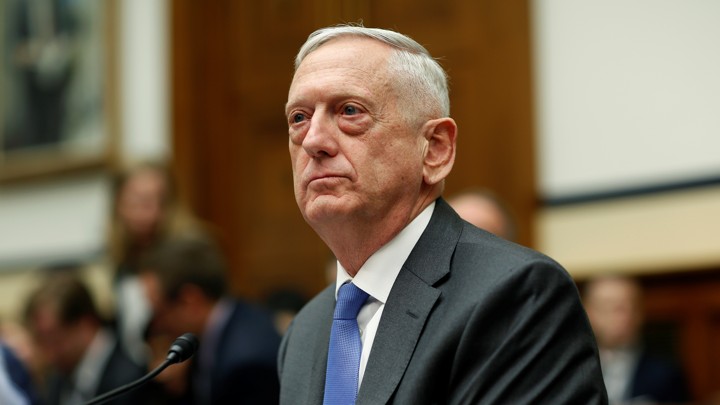by Kori Schake
 Since Jim Mattis grounds himself in the classics, it seems fitting to mark his resignation with a passage from Epictetus: “Authentic freedom places demands on us.” The quiet integrity with which he has done his job modeled a stoicism rare in our febrile political climate and sadly lacking elsewhere in the Trump administration. Mattis’s resignation letter may have been his most important act as the United States’ 26th secretary of defense.
Since Jim Mattis grounds himself in the classics, it seems fitting to mark his resignation with a passage from Epictetus: “Authentic freedom places demands on us.” The quiet integrity with which he has done his job modeled a stoicism rare in our febrile political climate and sadly lacking elsewhere in the Trump administration. Mattis’s resignation letter may have been his most important act as the United States’ 26th secretary of defense.
His resignation letter did two important things in these fraught times, as the president of the United States is corroding the norms that have defined our democracy: First, it made a strong case for the worldview that has dominated American foreign policy for the past 70 years, and second, it acknowledged that the elected president has a right to a Cabinet that works to advance the president’s objectives.
Arguing for an America that appreciates our friends and has cautious trepidation about our enemies is a striking criticism of the president’s view of the world. Many of the president’s advocates have tried to argue that “America first” doesn’t mean “America alone.” The outgoing secretary of defense just revealed that to be flatly untrue: Mattis’s main objection to the president’s policies was that they are damaging the international order of alliances that has been so conducive to the safety and prosperity of our country.
Two years is not an enormous amount of time to shape an institution as unwieldy as the Pentagon; Mattis’s legacy as secretary will not be what he accomplished internal to the department, or what by now appears to have been a transient increase in resources for the department.
His choice to do his job silently, while perhaps understandable given the president’s envious narcissism, has been detrimental to the war effort. Granted, the president and the Congress are principally responsible for taking the country to war and determining what level of our national effort to commit to war efforts. President Donald Trump is disgracefully detached from any sense of responsibility for the men and women he puts in harm’s way. Nor does the Congress shoulder its share of responsibility, declining to exercise its constitutional prerogative of deciding when America should go to war—its complicity in stretching the 2001 Authorization for the Use of Military Force to cover current operations should alarm all Americans.
But the secretary of defense also has obligations to his other constituents: the soldiers, sailors, airmen, and marines of our country’s military services. The secretary owes them a voice not just in policy making but in shaping public understanding of their service, and Mattis has not provided that voice.
Policing civil-military issues is an important element of the secretary of defense’s job. No one knows that better than Mattis, the first recent veteran to serve as secretary since George Marshall in 1950, and the co-editor of an excellent book on civil-military relations. It was shocking, therefore, to see the president sign his travel ban in the Hall of Heroes at the Pentagon early in the administration. Allowing such a highly political decision to be enacted in that venue suggested a national-security basis for the policy and detrimentally associated our military with the ban. That the White House sprung that trap on the Department of Defense illustrates the gale-force political winds in which the secretary has been operating. And in grading his work, the force of those winds needs to be taken into account, just as the degree of difficulty is taken into account when grading Olympic diving.
The president of the United States has transgressed civil-military norms frequently—treating speeches to troops as campaign rallies, using military titles for civilian appointees to give the appearance of military support for him personally and for his policies. The vice president, too, is a flagrant violator of civil-military norms. He used a Naval Academy graduation as a political rally. And Trump is attempting to cast Mattis’s resignation as a military retirement rather than a conscientious objection to his policies.
The president has not visited troops in combat zones. Mattis said he’d advised the president not to do so, that it was too dangerous. That excuse prevented the president from using the military as a political backdrop and associating it with his political choices. Nor have there been pictures of the president with troops deployed on the border. In these ways, Mattis did his best to shield the military from Trump.
Mattis attempted to appoint bipartisan defense experts in his department; he reached wide for counsel, built relationships on both sides of the congressional aisle, garnered the votes of 97 senators for last year’s Defense Appropriations Bill, and did well to protect the defense enterprise from politicization against overwhelming force. That will be his legacy.
In an incredibly poignant speech at the Merchant Marine Academy earlier this year, Mattis praised an unsung hero of the Korean War. On his own initiative, Leonard LaRue, who commanded the SS Meredith Victory, rescued 14,000 refugees during the North Korean offensive in 1950. “He was competent; he was aware of danger and stoically he dealt with it,” Mattis said. So, too, the 26th secretary of defense, James Norman Mattis.
No comments:
Post a Comment